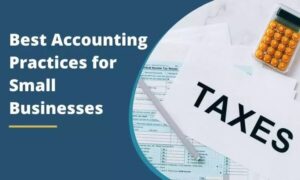
Introduction
Accounting is a crucial aspect of running a successful small business. Proper financial management ensures compliance with tax laws, enhances decision-making, and promotes business growth. By following best practices in accounting, small businesses can stay financially healthy, avoid penalties, and maximize profitability.
What is Small Business Accounting?
Small business accounting involves recording, tracking, and managing financial transactions, including income, expenses, assets, and liabilities. It encompasses bookkeeping, tax filing, financial reporting, and compliance with financial regulations.
Benefits of Proper Accounting
- Financial Clarity: Helps businesses understand their financial position.
- Regulatory Compliance: Ensures timely tax payments and legal adherence.
- Improved Decision-Making: Provides insights for budgeting and investment.
- Cash Flow Management: Prevents financial shortfalls and cash crunches.
- Business Growth: Enables strategic planning and scaling opportunities.
Step-by-Step Guide to Small Business Accounting
1: Separate Business and Personal Finances
- Open a dedicated business bank account.
- Use a business credit card to keep expenses organized.
- Avoid mixing personal and business transactions.
2: Choose the Right Accounting Method
- Cash Basis Accounting: Recognizes income and expenses when cash is received or paid.
- Accrual Basis Accounting: Recognizes income and expenses when they are incurred, regardless of payment.
- The accrual method is generally recommended for larger businesses.
3: Use Accounting Software
- Consider cloud-based accounting solutions like QuickBooks, Xero, or FreshBooks.
- Automate invoicing, expense tracking, and financial reporting.
- Reduce human errors and save time with digital accounting tools.
4: Track Income and Expenses Regularly
- Maintain records of all sales, receipts, and expenditures.
- Categorize expenses for tax deductions and budgeting.
- Set aside funds for taxes to avoid last-minute liabilities.
5: Create and Maintain Financial Statements
- Balance Sheet: Summarizes assets, liabilities, and equity.
- Income Statement: Shows revenue, expenses, and profit.
- Cash Flow Statement: Tracks money coming in and out of the business.
- Regularly reviewing these statements helps in financial planning.
6: Stay Tax Compliant
- Obtain an Employer Identification Number (EIN) for tax filing.
- Understand federal, state, and local tax obligations.
- Make estimated tax payments quarterly if required.
- Keep tax records organized for at least three to seven years.
7: Monitor Cash Flow
- Keep track of incoming and outgoing cash.
- Maintain a cash reserve for emergencies.
- Avoid overextending credit to customers to prevent cash shortages.
8: Set Up Payroll and Employee Taxes
- Classify employees correctly as W-2 (employees) or 1099 (contractors).
- Deduct payroll taxes and remit them to the IRS and state agencies.
- Use payroll software like Gusto or ADP to automate calculations and payments.
9: Prepare for Audits
- Keep accurate records of financial transactions.
- Reconcile bank statements with accounting records monthly.
- Maintain receipts and documentation for expenses.
- Conduct internal audits periodically to ensure compliance.
10: Consult an Accountant or CPA
- Hire a professional for tax filing and financial guidance.
- Seek advice on deductions, business structure, and growth strategies.
- CPAs can help navigate complex tax laws and audits.
Usage of Accounting Practices in Small Businesses
- Startups: Helps secure funding and track expenses.
- Retail Businesses: Manages inventory and cash flow.
- Freelancers & Contractors: Organizes income sources and tax deductions.
- Service-Based Businesses: Tracks billable hours and invoicing.
Limitations of Small Business Accounting
- Time-Consuming: Manual bookkeeping can be tedious.
- Software Costs: Quality accounting software requires investment.
- Learning Curve: Understanding tax codes and financial reports takes time.
- Risk of Errors: Poor record-keeping may lead to tax penalties and audits.
Cooperative Table for Small Business Accounting
| Accounting Task | Importance | Tools & Best Practices |
|---|---|---|
| Bookkeeping | High | Use QuickBooks, Xero, FreshBooks |
| Expense Tracking | High | Categorize expenses, save receipts |
| Tax Compliance | Critical | Hire a CPA, file taxes on time |
| Payroll Management | Medium | Use Gusto, ADP, pay employee taxes |
| Financial Reporting | High | Analyze profit & loss, cash flow |
| Auditing | Medium | Conduct internal audits yearly |
Conclusion
Small business accounting is essential for financial stability and business success. By implementing best practices such as using accounting software, tracking income and expenses, staying tax-compliant, and consulting a CPA, businesses can streamline their financial management and avoid costly mistakes. Prioritizing sound accounting principles ensures growth, profitability, and peace of mind.
FAQs
How Can I Quickly Improve My Credit Score in the U.S.A
How to Refinance Student Loans with Bad Credit in the USA?
Best Credit Cards for Cash Back Rewards in the U.S.A
Best high-yield savings accounts 2025
For further details access our website https://vibrantfinserv.com/
To visit: https://www.mca.gov.in/
Contact: 8130555124, 8130045124
Whatsapp: https://wa.me/918130555124
Mail ID: operations@vibrantfinserv.com
Web Link: https://vibrantfinserv.com
FB Link: https://fb.me/vibrantfinserv
Insta Link: https://www.instagram.com/vibrantfinserv2/
